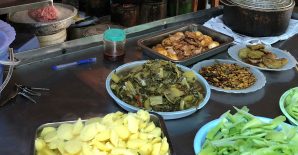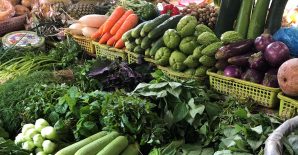This post first appeared on CGIAR's website. View it here.
The global development community has been building toward September’s United Nations’ Food Systems Summit (UNFSS) for much of the past two years. The process has involved dialogues at the local, national, regional, and global levels, consultations with a wide variety of stakeholders, and the dissemination of new studies and reports. As a result, critical failings have been highlighted and innovative game-changing solutions proposed.
One thing has become clear in the process: food systems are complex and interdependent and include a wide range of activities and actors, from those who grow food to those who consume it and everyone who handles it in between. Yet with a healthy diet out of reach for 3 billion people and poor-quality diets driving all forms of malnutrition and contributing to premature mortality, it is also painfully clear that our food systems are failing to provide healthy, safe, affordable, and desirable food for everyone, everywhere.
Food systems involve and affect everyone on the planet, but different individuals experience food systems in different ways. Women, children, youth, migrants, informal sector workers, and small-scale farmers are among those most often bearing negative impacts of food systems in terms of low and unstable incomes, limited access to sustainable healthy diets, and undesirable nutrition and health outcomes. Moreover, current food systems are not environmentally sustainable, and transforming them will require understanding how to make hard choices that consider trade-offs among greenhouse gas emissions, diet quality, food safety, income, and other food systems outcomes.
UNFSS’s stated vision is to “launch bold new actions, solutions, and strategies to deliver progress on all 17 Sustainable Development Goals (SDGs), each of which relies on healthier, more sustainable, and more equitable food systems.” As coalitions emerge and countries prepare to set commitments, how can we ensure that food systems are transforming in ways that provide the sustainable healthy diets people need to realize their full potential, while also ensuring equitable employment and income opportunities and protecting the planet?
With a long track record of innovation in agricultural research for development, CGIAR has now turned its focus to the challenge of transforming food systems to ensure sustainable healthy diets for all. Building on a rich foundation of research, Sustainable Healthy Diets through Food Systems Transformation (SHiFT) is a new initiative aiming to identify transformative innovations and policies, and strengthen stakeholders’ capacity to guide decision-making toward food system transformations that support and enable consumption of sustainable healthy diets for all, while improving livelihoods, income, gender equity, and social inclusiveness. The initiative, which is part of CGIAR’s innovative new proposed portfolio of research to transform food, land, and water systems in a climate crisis, will grow from CGIAR food systems partnerships and work in Bangladesh, Viet Nam, and Ethiopia, and expand its work to India, Honduras, Guatemala, Senegal, and Benin.
Of particular importance for this work will be:
- Stimulating consumer demand to achieve sustainable healthy diets for all: According to the High-Level Panel of Experts on Food Security and Nutrition, the “food environment” encompasses the physical, economic, political, and socio-cultural context in which consumers engage with the food system to make their decisions about acquiring, preparing, and consuming food. No matter what actions are taken in other parts of the food system, the choices consumers make — based on access, convenience, affordability, preferences, and other factors — ultimately determine whether or not they consume a sustainable healthy diet. In many low- and middle-income countries (LMICs), healthy diets are unaffordable for a large share of the population, disproportionately affecting the poor. As a result, consumers often turn to processed or ultra-processed foods, often rich in calories and poor in nutrients, because they are filling, tasty, cheap, convenient, and available. Stimulating the consumption of sustainable healthy diets will require identifying actions in food environments to put those diets within consumer reach—and incentives to encourage consumers to choose them.
- Supporting micro, small, and medium enterprises (MSMEs) and the informal sector to deliver sustainable nutritious foods, while ensuring inclusive employment and income opportunities: Food systems are a major source of employment in LMICs, but many such jobs are with MSMEs or in the informal sector. Informal markets, street food vendors, and small shop owners are key points of food access for millions around the world, so the foods they sell should be nutritious and affordable. MSME and informal sector producers and vendors should also benefit from better and more stable wages and employment conditions, particularly for groups such as migrant workers, women, youth, and other marginalized groups. Better understanding how to support these food system actors to ensure they supply affordable, safe, and nutritious foods benefiting consumers while also improving their employment, labor conditions, and income growth opportunities is essential.
- Fostering best practices for governance and inclusive policy: Existing policies and competing priorities and interests can stymie change in food systems, impeding desirable outcomes for food system transformation. Policymakers and other stakeholders need resources and tools to understand, identify, and address existing political and social tensions and barriers blocking transitions, as well as incentives to facilitate or accelerate the transformation toward sustainable healthy diets. With sharper knowledge and effective tools, they can better evaluate and prioritize alternate courses of action that ensure food systems transform to meet national objectives and global development goals in ways that remain equitable for all.
- Tackling trade-offs associated with food systems’ multiple objectives, incentives, and outcomes: The all-encompassing nature of food systems and their outcomes means there are bound to be trade-offs, whether in diet quality, food safety, environmental sustainability, or other factors. Scenario modeling and decision-support tools and approaches can help stakeholders identify, understand, and weigh actions, building capacity to navigate potential trade-offs in country-specific ways and inform decision-making when facing conflicting interests, values, and outcomes.
- Consolidating coalitions for change: Understanding the consumer experience, informal food environments, policies, and trade-offs constitute critical insights, but food system transformation needs to be supported and led by key civil society and public actors in specific countries and regions to drive change in practice. For this, consultations designed through deliberative and problem-solving approaches are needed to identify, co-design, and support the creation of transformative paths, the establishment of road maps at national or subnational levels, and the agreement on different roles of stakeholders.
The UNFSS has shined an important light on the shortcomings of our global food systems, highlighting the urgent need for action to remedy them while supporting the consolidation of sustainable, resilient, healthy food systems moving forward. Indeed, we cannot meet the SDGs without transforming food systems across low- and middle-income countries in a way that promotes sustainable healthy diets for everyone, everywhere; fosters environmental sustainability; and builds equity through employment and other opportunities. To do so, research through SHiFT and similar research programs will be crucial to help countries understand the benefits, risks, and trade-offs of paths forward, no matter where they are in their food systems transformations.
Marie Ruel is the Director of the Poverty, Health, and Nutrition Division at the International Food Policy Research Institute (IFPRI). Mark Lundy is the Director of Food Environment and Consumer Behavior at the Alliance of Bioversity International and CIAT.
The authors would like to thank Christophe Béné, Principal Scientist, Sustainable Food Systems, Alliance of Bioversity International and CIAT; Inge Brouwer, Associate Professor, Human Nutrition and Health, Wageningen University & Research; Alan de Brauw, Senior Research Fellow, Markets, Trade, and Institutions, IFPRI; and Jef Leroy, Senior Research Fellow, Poverty Health and Nutrition, IFPRI, for their contributions to the writing of this piece.
Can employer-provided on-site meals provide an avenue to improve diets and catalyze food system changes?
The authors map national food system transformations in a recently developed typology, using economic, social, dietary, and environmental outcomes to examine whether there are linear patterns as countries move from one categorization to another.
PhD candidates with A4NH's Food Systems for Healthier Diets research flagship reflect on what they learned about engaging in national food system transformation during the course of their study.



